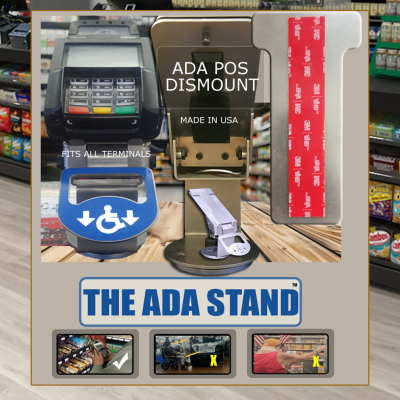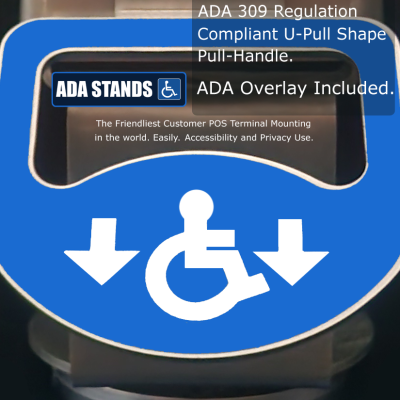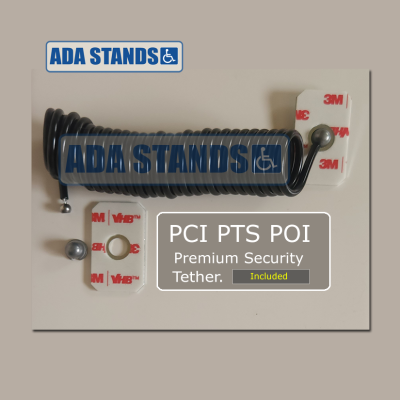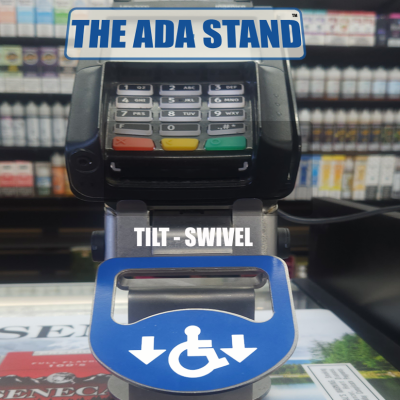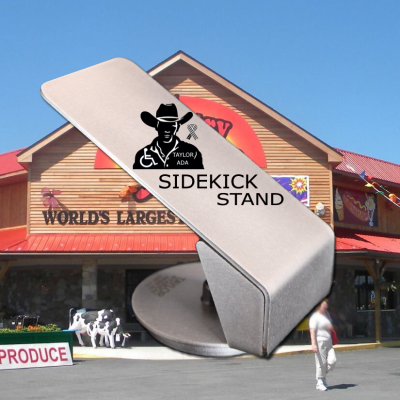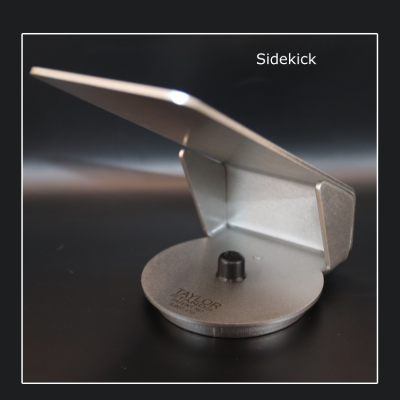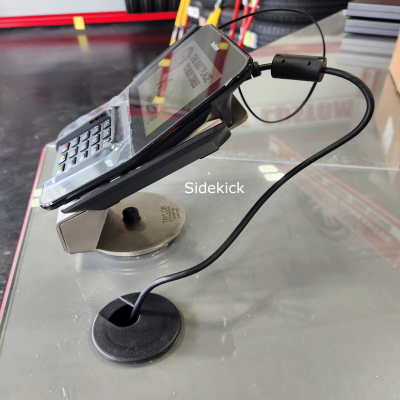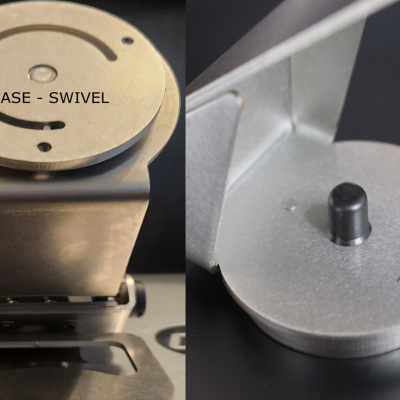ADA/508 (ICT) EIT
Accessibility - Checkout.
CAL-FIN 13082
What is CAL-FIN 13082? It is an accessibility at the checkout law for credit card terminal use. It also pertains to how the credit card terminal is mounted which involves ADA, ABA, 255cpe, 504, 508, ICT, and other regulatory compliance requirements such as PCI - PIN transaction security and its POI - Point of Interaction.
Individuals with disabilities shall be entitled to full and equal access, as other members of the general public, to accommodations and facilities. "Full and equal access" is defined as meeting the requirements of the Americans with Disabilities Act of 1990 (ADA). (Civil Code Section 54.) plus the UNRUH ACT.
To meet these requirements, businesses must employ an assistive technology mount for their credit card terminal and to be positioned within the appropriate reach range and adjusted for optimal universal usability for accessibility accommodation. The ADA Stand™ is the mounting solution designed specifically to ensure that POS terminals are fully accessible and comply with ADA standards as well as the CAL-FIN 13082.
The CAL-FIN 13082 expands the ADA.Gov on a few specifics, including the ADA scoping for accessibility accommodations for the blind and other accessibility issues. It also runs alongside the UNRUH Act. This law became active on January 1, 2006, and has enforcement of $4000 to $6,000 fines.
To ensure businesses comply with California Financial Code Section 13082 and broader ADA, ABA, and ICT accessibility requirements, the following strategy outlines key steps for implementation.
General issues found in businesses at the checkout with credit card terminals:
-
Height Exceeds Reach Limits: The terminal might be mounted higher than 48 inches (or 44/46 inches over an obstruction), making it unreachable for a wheelchair user whose typical reach is lower due to seated position.
-
Obstruction Depth: If the terminal is on a counter deeper than 25 inches without adequate knee/toe space, even a 48-inch height becomes inaccessible.
-
Lack of Clear Space: If there’s insufficient room (less than 30x48 inches) or obstacles block the approach, the user can’t position themselves to reach the terminal.
-
Cashier Limitation: The cashier’s inability to help suggests the terminal isn’t portable or adjustable, and no alternative (e.g., a handheld device) is provided, which violates the ADA’s and UNRUH ACT requirements for reasonable accommodations in public accommodations (Title III).
-
Evaluate current POS setups to determine if they meet height, reach, and usability standards.
-
Identify whether the terminal lacks tactile keypads or accessibility features for visually impaired users.
To meet legal requirements, businesses should install ADA-compliant POS mounting. The ADA Stand™ is the only credit card terminal mounting in the world that uses the ADA 309 Operable Part U-shape pull handle, ADA 309.4 Operation requirements of no twisting of the wrist, no pinching, no grasping, and has the independent accessible detach fo device dismount. This allows the customer to use the securely mounted credit card terminal standing or can detach and dismount the credit card terminal and hold to use as needed, allowing for PIN entry privacy and ADA screen accommodation. This also covers ADA limited reach and strength and includes the attachments of building code requirements. ADA 36.402.
Real-World Implications
While CAL-FIN 13082 (as discussed earlier) focuses on visual accessibility, the physical reach issue falls under ADA and CBC spatial standards. A terminal mounted too high or too far back on a counter—common in older or poorly designed setups—directly contravenes these rules. Businesses must ensure compliance, or they risk lawsuits under the ADA or California’s Unruh Act, which ties accessibility violations to civil rights penalties.
The CAL-Fin 13082 also requires businesses to use credit card terminals that use tactile buttons (real buttons), not on-screen buttons like Clover as example.
The IRS offers a 50% assistive-technology Tax Credit. Making the ADA Stand $164.50 after Tax Credit is applied.
The ADA Stand™ - DISMOUNT FOR RETAIL CHECKOUT
$329.00
(Payment Device Not Included) The ADA STAND™ is the only assistive-technology credit card terminal stand fully compliant with U.S. Federal Accessibility standards, including 508 (ICT), ADA operability, visual accommodation, limited reach, and strength requirements. It also meets VISA, ISO 9564, and PCI security/privacy protocols. If your business has ADA parking, ADA-accessible checkouts are also required. MADE IN USA. Patented. A 50% IRS TAX CREDIT IS AVAILABLE.
SIDEKICK STAND
$129.00
TAYLOR - SIDEKICK STAND NEXT-GEN Fixed Countertop Stand. Premium No Rust, Non-Magnetic Stainless Steel, and built like a tank. SWIVEL, SECURE POS DEVICE. MADE IN THE USA 100%. Fits all POS device models, Verifone, Ingenico, Dejavoo, PAX, and other brands. Free Shipping.
ADA STANDS - FOR RETAIL CHECKOUT
MADE IN THE USA
The friendliest customer POS terminal mounting in the world. By Far.

